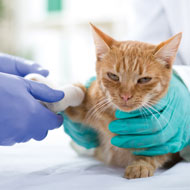
BVA issues advice to help owners protect their pets
Almost all vets have treated cats for injuries sustained in road traffic accidents (RTAs), falling from a height and walking on hot surfaces, according to new research.
Figures published by the BVA show that a staggering 94 per cent of vets had seen cats injured by RTAs - with one vet treating 99 cases during a 12-month period.
BVA’s Voice of the Veterinary Profession Survey, which sampled some 800 companion animal vets across the UK, revealed that, on average, vets saw twice as many cat RTA injuries as cases of similar dog injuries.
The most common cat injuries cited by the respondents were caused by cats falling from a height, airgun injuries and burns.
"Vets are seeing a shocking number of cat injuries in their surgeries. These statistics should make owners stop and think about whether their homes and gardens are safe enough for their cats,” commented BVA president Gudrun Ravetz.
"Cats are agile and adaptable animals, but their nine lives are a myth. The good news is that cat owners can take some simple steps to protect their pets from the most common accidents and injuries, including using reflective collars, keeping cats indoors overnight, and being careful in the kitchen and with open windows.”
In response to their findings, the BVA has compiled a list of tips to help owners keep their cats as safe as possible. These include:
- getting a reflective collar, so that cats are visible to car drivers at night
- keeping cats indoors at night;
- getting cats neutered so that they roam less and stay closer to home
- making sure windows above the ground floor are not opened wide enough for cats to fall through
- keeping cats away from the kitchen during cooking, making sure hobs are cooled and covered before allowing access again.
BVA’s Voice of the Veterinary Profession Survey is a bi-annual survey of veterinary surgeons and veterinary students. The Spring 2016 survey was completed by 1,648 BVA members, 802 of which completed the question on cat and dog injuries.



 The Animal and Plant Health Agency (APHA) has updated its online reporting service for dead wild birds.
The Animal and Plant Health Agency (APHA) has updated its online reporting service for dead wild birds.